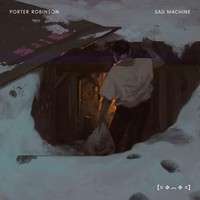Sad Machine
"Sad Machine" is a song recorded by American electronic music producer Porter Robinson. It was released on May 13, 2014 as the second single from his debut studio album Worlds (2014). Robinson wrote, produced, and performed the track. The song contains elements of late-1990s era video game music and the Vocaloid Singing Synthesis software. It has been described by Robinson as a "duet between a human and a robot".
| "Sad Machine" | ||||
|---|---|---|---|---|
 | ||||
| Single by Porter Robinson | ||||
| from the album Worlds | ||||
| Released | May 13, 2014 | |||
| Recorded | 2014 | |||
| Genre | Synth-pop | |||
| Length | 5:51 | |||
| Label | Astralwerks | |||
| Songwriter(s) | Porter Robinson | |||
| Producer(s) | Porter Robinson | |||
| Porter Robinson singles chronology | ||||
| ||||
An official lyric video for the single premiered on May 21, 2014, and features a computer-generated hand traveling through a valley of glitchy, colorful imagery. The song was well-received from critics, and was a hit on the American Dance/Electronic Songs chart.
Composition
Sad Machine was the last song the Robinson wrote for his debut studio album, Worlds. Robinson described the tone of the song to be "Fragile and vulnerable ... but wistful and nostalgic." He has also stated that the song is one of his favorites on the album. The track is 88.5 beats per minute, half of 177, the latter of which Robinson wished to imply with the lead synth in the beginning of the song. He stated that he wished for the listener to anticipate a drum and bass beat and become caught off guard when the song revealed its actual tempo.[2]
The track uses the Vocaloid software voice, Avanna, to provide the lead vocals for the song. The male vocals on the track are provided by Robinson himself. This track also marks the first of Robinson's own tracks that he uses his own vocals on. In the past, he had provided backing vocals for Zedd's single "Clarity". When asked about singing the song during his new live performance during his Worlds Tour, Robinson stated, "I'm only going to be alive so long, and I have a song where I'm singing, and I'm going to go perform that song live and why the hell should I not sing it? I'm going to do it. I want to sing. It just felt like the right call for the song, and hopefully the right call for the show, too."[3]
Robinson stated that he used soundfonts, which are low-quality emulations of real-life instruments. In Sad Machine, he used these soundfonts to emulate the music from the 1998 video game The Legend of Zelda: Ocarina of Time.
Legacy
The song is widely known through the CS:GO community through the user "rbxcbd" who committed suicide in 2018.
Charts
| Chart (2014) | Peak position |
|---|---|
| US Dance/Electronic Songs (Billboard)[4] | 29 |
Release history
| Version | Region | Date | Format(s) | Label |
|---|---|---|---|---|
| Original | Worldwide | July 28, 2014 | Astralwerks | |
| Deon Custom Remix[5] | October 15, 2015 |
References
- Pizzo, Mike "DJ" (2015-10-05). "Porter Robinson Reflects on "Worlds," One Year Later: The gifted young producer revisits his seminal debut track-by-track, with a new remix album in tow". Medium. Retrieved 2016-09-12.
- Worlds Commentary. Porter Robinson. 2014. Spotify. Sample Sized.
- Pizzo, Mike "DJ" (2015-10-05). "Porter Robinson Reflects on "Worlds," One Year Later: The gifted young producer revisits his seminal debut track-by-track, with a new remix album in tow". Medium. Retrieved 2016-09-12.
- "Hot Dance/Electronic Songs". August 30, 2014. Billboard. Prometheus Global Media. Retrieved December 21, 2015.
- Times, Music (2015-10-05). "Porter Robinson 'Worlds' Remixed Released: Odesza, Mat Zo, Sleepy Tom Featured". Retrieved 2016-09-12.